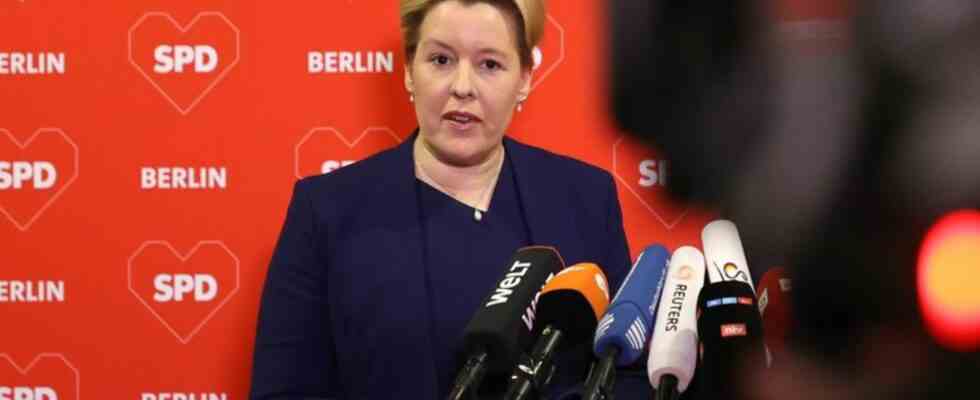House of Representatives
SPD in Berlin wants to be a small partner of the CDU
Will the capital get a black and red government? Franziska Giffey and her Berlin SPD want to enter into coalition negotiations with the election winner, the CDU. photo
© Jörg Carstensen/dpa
The SPD has been in power in Berlin for 34 years now. In the 90s, however, she was a small partner of the CDU, which did not go down well with her. Franziska Giffey now wants to reissue the model.
After the Berlin SPD pivoted towards a possible coalition with the CDU, Berlin’s governing mayor Franziska Giffey (SPD) is under pressure to justify herself. In numerous interviews on Wednesday evening and Thursday morning, she defended the decision of the SPD state executive. In seven tweets, she once again explained her reasons for preferring an alliance as a small partner of the CDU, and not an SPD-led government with the Greens and the Left. Criticism came from the left and the Greens – and also from the SPD youth organization Jusos.
The leadership of the Berlin CDU wanted to meet on Thursday afternoon to announce their decision. CDU top candidate Kai Wegener also prefers the coalition with the SPD and wants to succeed Giffey as the new governing mayor. In the repeat election on February 12, the SPD ended up with 18.4 percent of the votes, well behind the election winner, the CDU (28.4 percent).
On Wednesday evening, the SPD state executive announced that the party wants to conduct coalition negotiations with the CDU. The decision was made with 25 yes votes to 12 no votes. Giffey spoke of “respect for the election result” for the CDU and more content overlaps with the CDU. With the previous partners, the Greens and the Left, there could not have been a real new beginning.
The Greens “were getting signals that goals that were important to us were being put into perspective,” Giffey said on Deutschlandfunk on Thursday. But the decision was “very difficult”. “We really didn’t take it easy on ourselves,” Giffey said. “Entering an alliance in which we lose the Red City Hall is not an easy decision.” She admitted that there was “a lot of skepticism” within the SPD about a coalition with the larger CDU.
More “creative power” hoped
The SPD leadership hopes that a change to the CDU will give them more chances of success in the next parliamentary elections in 2026. In the past six years, the coalition with the Greens and the Left has had a “high number of unresolved internal coalition conflicts,” according to the internal report the SPD exploratory commission. The prospects for the 2026 elections are “hardly positive in a crisis-ridden alliance,” especially for the weakened SPD. A two-party alliance with the CDU offers more “shaping power” and “less friction losses”. By 2026, “improved profile building” is possible.
The SPD left and former Secretary of State for Education Mark Rackles called the report “interest-driven” and wrote: “The result of the exploratory talks was already certain.” Giffey specifically wanted a coalition with the CDU. Rackles had already predicted Giffey’s move last week.
The SPD youth organization Jusos wants to stop the alliance with the CDU via the upcoming membership decision. “What will and must follow now is the largest internal party campaign that the SPD Berlin has ever seen,” tweeted the Jusos. “We have made our position clear on the SPD board, unfortunately without success.”
Wissler: Fatal decision by the SPD
The co-chair of the Left Party, Janine Wissler, spoke of a “fatal decision” by the SPD. “How are you supposed to push through affordable rents or the traffic turnaround with the CDU in Berlin? The CDU made it clear in the election campaign that it doesn’t stand for exactly that,” Wissler told the radio station SWR Aktuell.
The former Neukölln SPD member of the Bundestag, Fritz Felsentreu, spoke on Wednesday of the right approach. “The frustration with red-green-red was dumped on the SPD.” Continuing this coalition under much more difficult conditions is not a good prospect. “To try it with black and red, like the SPD Berlin is knitted, is a courageous, almost foolhardy way.”

